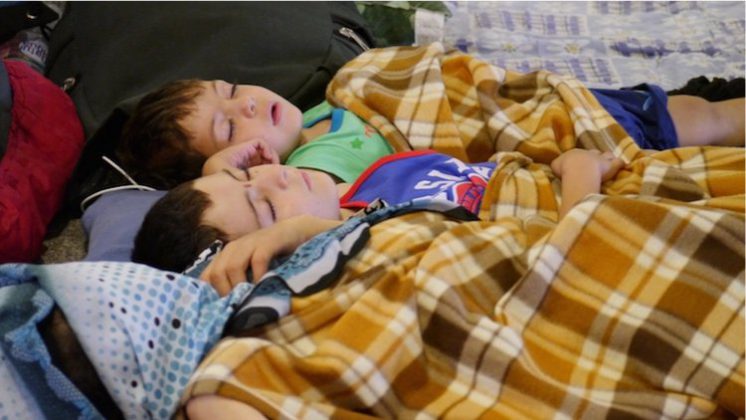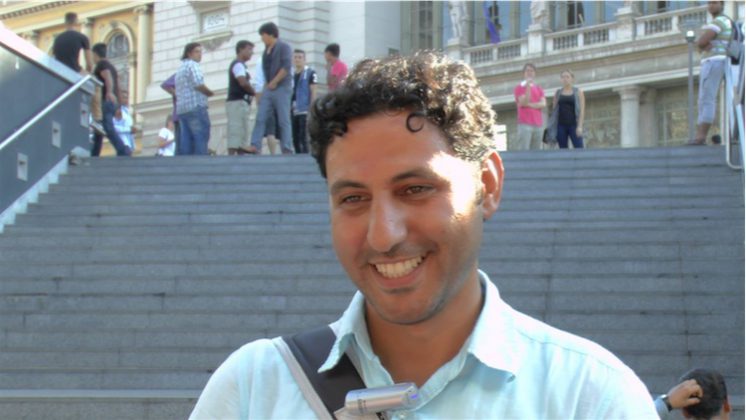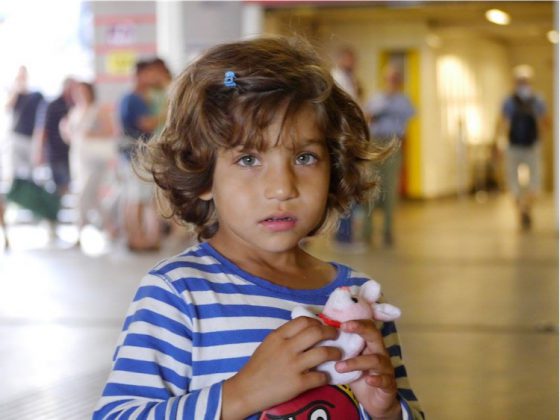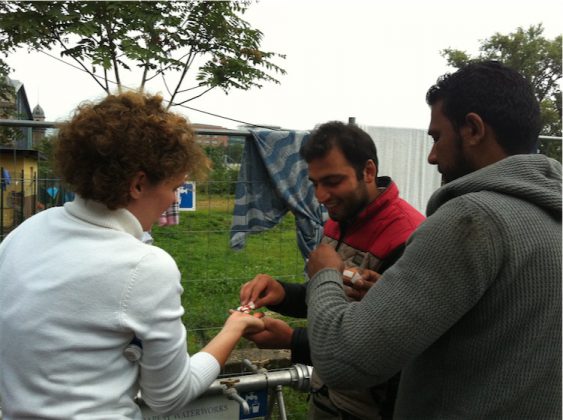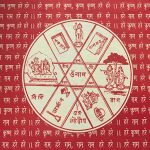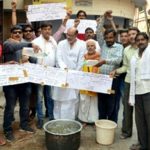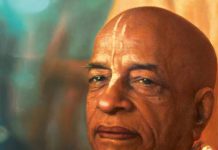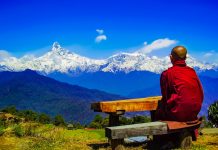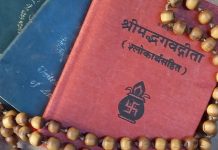by Krisztina Danka, Ph.D. (Krishna-lila Dasi) The Huffington Post on Oct. 7, 2015
“The wise men treat everybody as equals, whether it be a learned and cultured brahmana, a cow, an elephant, or a dog and an outcaste. He does not differentiate between anybody.” (Bhagavad-gita 5.18)
Recently, I had trouble sleeping for weeks. When I lay down in my comfortable apartment in Budapest, Hungary, all I could see in my mind are images of babies and little children lying on the dirty floor of Budapest’s railway stations, or a damp field near the border waiting for their transfer to a new, safer and better life. I would get up, tuck my beautiful five-year old daughter in, and pray that she would never face the hardship those innocent children have had and still have to endure.
In early summer 2015, when my family and I came back from New York to spend some months in my home country of Hungary, I saw the forest of giant government-sponsored posters exhorting Middle-Eastern refugees in Hungarian to respect the country’s culture and not to steal Hungarians’ jobs. I told my husband, “Oh boy, this is going to be ugly.” Although born and raised in New York, and having only a vague knowledge of my country’s past and present, he could read between the lines too, and tell who these messages were really for, and what kind of reactions they were meant to evoke in an ethnically homogeneous country, where citizens are not accustomed to coexist with different cultures, religions or those of a different skin color.
What happened turned out to be way worse than we expected.
Over this past summer, Hungarian people started to hear a gradually increasing number of stories in the media about refugees (alternately called migrants or immigrants) coming from war-torn countries, or their neighboring nations, allegedly stealing fruits from Hungarian people’s orchards, leaving garbage on the roads near the border, or complaining loudly about the over-crowdedness of the refugee camps or about not being allowed to leave for western countries as soon as possible. In a majority of these stories, the refugees are portrayed as uncultured, arrogant or violent criminals.
Being a filmmaker myself, I know how easy it is to present certain narratives as “facts.” So finally, I decide to do my own research and make my own assessments: what kind of people are these migrants, really; and am I supposed to be so afraid as to feel threatened by them?
Early on the morning of September 1st, 2015, I join with some Hare Krishna friends who, at the request of Migration Aid, a local volunteer group, have been serving hot breakfast to hundreds of refugees, who have arrived from the country’s southern border to Budapest’s so-called Transit Zones, specifically designated areas at railway stations. Here, there are ostensibly basic facilities such as water, toilets and first aid, with clothes and food provided by volunteers and non-governmental organizations.
When I arrive at around 6 AM, I see Kata, a Hungarian aid worker, welcoming hundreds of exhausted refugees getting off the train. She gives them a big smile, and with the help of a handful of policemen, she shepherds them into the Transit Zone, while handing out leaflets in Arabic, Farsi and other languages containing useful information to help them get their bearings in this country. When I ask her why she has been coming here almost every morning for three months, Kata replies: “I got very upset by those posters. No one should greet asylum-seekers in my name with prejudice and hatred. They should be helped, and treated with love and respect.”
While playing catch with a four-year old Syrian boy, a volunteer called “Baba” – a big, tattooed fellow of Hungarian and Egyptian origin – adds, “a society is not determined by it’s religion or political system, but by how it behaves towards those who are in need.”
The first impression I have of the refugees themselves is the presence of an overwhelming number of families with babies and small children, which is unexpected. Hungarian national television has elected to show only muscular young men among them. Although most of these people have not had a warm meal for weeks, they are patiently queuing up in front of the food tents, with children and women first. Considering how far they have had to travel, and under what conditions, they look clean, neat and relatively well groomed.
By their looks and demeanor, one can tell that though these people may be literally homeless, they are not vagrants.
While 28 year-old Aya changes the outfit of her four-month-old son on the dirty floor of the railway station, she tells me that she is an elementary school teacher. Her doctor husband was running a private clinic in Aleppo, Syria, before their town was invaded, their house bombed, and they had to flee. She once had a beautiful home. Still, here in Budapest, when a volunteer offers her a mat to sit on and an umbrella to protect her small children from the scorching heat, Aya’s eyes are filled with tears of gratitude.
Aref tells me he was a university professor of comparative linguistics in Damascus. Some of his close relatives were executed, so feared for his life he decided to leave the country. Although he knows it is not going to be easy to start over, Aref seems hopeful about the future. The only time he chokes up and diverts his eyes away from me is when he talks about his parents, who fled to Jordan, and who, due to visa restrictions, he has not seen in over two years.
Over a bowl of lentil soup, 16-year Ahmad from Afghanistan tells me that he was the junior kickboxing champion in his country. He speaks three foreign languages: Urdu, Hindi and English, and his dream is to go to university in Germany. His older brother was beheaded by the Taliban because he was an interpreter working for the American troops. Ahmad fled the country with his brother’s eight-month pregnant widow and her two small children. (Wow, I thought, when I was eight months pregnant I could barely move, and this woman has just crossed half a continent.)
As I hand out bread, fruit juice, chocolate, plus a stuffed pink bunny and a small cow from my daughter’s toy stash, to Ahmed’s nieces, a smiling man steps over to me and introduces himself as Abdulhay from Daraa, Syria. He apologizes for bothering me, and says he just wants to thank me and all the Hungarian volunteers for what we have been doing to help the people in need here.
We start chatting. I find out he was an interior designer running his own company with over a hundred employees. His wife is a Shiite, he is Sunni, but this has never created a conflict between the two of them, he says — they have been happily married for fifteen years, with two teenaged boys. He tells me that their house and business got bombed and were completely destroyed; so he and his family fled to save their lives. Despite the hardship he has endured at home, and on the arduous journey across the sea and the Balkans, Abdulhay seems to have maintained a positive attitude, and a solid faith in the kindness of humanity.
I wish I could say the same about some of my countrymen.
While thousands of Hungarians have been compelled to help and are busy making life a little easier for those who have been stripped of their last shred of dignity, and unsure about what is going to happen to them, many others in this country have started to express fear and serious objections towards the presence of, as they have put it, these “aliens”, “Muslim invaders” or “uncultured horde.” Facebook walls are full of photos of piles of garbage and discarded food left behind by the “animals,” with attached remarks about the naiveté of the members of the civil organizations that, in the absence of substantial help from the government, have decided to pick up the slack to offer aid.
At first, I patiently comment on these online postings, explaining that if a Muslim is given a salami sandwich, he is not going to eat it; not because he’s not hungry, but because his tradition forbids him to touch pork. (Being a strict vegetarian throughout my adult life, I can relate to that.) I also point out to some of my rageful fellow Hungarians that when you have to flee your country at a moment’s notice, it is unlikely that, along with your kids, passport, some money and a set of clothes, you will think of packing a broom, a pail, garbage bags or a bottle of disinfectant so you can clean the spot on the roadside, railway station or refugee camp where you are detained, then suddenly shepherded away from by the police.
As the days and weeks go by, and the situation escalates with more arrivals, an increasing number of migrant-condemning comments also come my way. I have to admit, I get angrier about this, since almost every one of the comments are from people who never met or talked to any one of the refugees. They do not see them as human beings, rather as a faceless, threatening mass.
A huge gap has developed within the Hungarian society. Heated arguments and harsh words erupt, even within families; lifelong friends “un-friend” one another. In this societal and cyber civil war, nobody’s life seems to be unaffected.
After my initial visit, however, I keep going to the Transit Zone. Why? Because that is a rare part of my country that I feel at home these days.
I keep going because I believe the only thing that should be separated by color is laundry.
I keep going because I don’t want to fail these people as human beings, and because I have seen first-hand how simple acts of humanity, like a piece of bread, a song, or even a smile, can make a difference.
I keep going because I feel inspired in the company of selfless aid workers, coming from different backgrounds and faiths, Jews, Christians, Muslims and Hindus, tirelessly tending to wounds or trying to ease the pain of the displaced and the dispossessed.
I keep going because I genuinely have grown to like many of these Muslim people; I feel good among them; I learn from them, as we exchange thoughts and laughter.
And I keep going because I feel indebted to these refugees for providing me the opportunity to experience the greatest of all joys – the feeling of being a small instrument of God’s grace.
Just as I am leaving the Transit Zone, I see a Hungarian Christian volunteer accidentally cut her finger, bleeding and in pain. Without hesitation, two young Muslim men, both Syrian refugees, come rushing over, tend to her wound, put a bandage on it, and stop the bleeding.
Behind them there is a young Syrian girl, who, just before boarding the train heading towards Austria, writes a message on the Transit Zone’s chalkboard wall:
“May God bless all nations and all countries.
May He protect you all, and guard you from fear and war.
What you give is what you get.
It doesn’t matter if we don’t meet again,
but what you have given to us,
will always remain with us.
PEACE & LOVE,
Ama”
Barbed wire, tear gas, water cannons and new laws ultimately convince the refugees to find another route. The Budapest Transit Zone becomes obsolete; and now, it has closed down.
For me, however, the Transit Zone always will be remembered as a blessed place. In a sea of war, hatred, confusion and prejudice, during one of Europe’s largest humanitarian crises, a dirty underpass in a railway station became a little isle of humanity, where everyone – asylum-seekers and their helpers alike – understood that after all, we are not Muslims, Hindus, Jews or Christians, in the end; we are not Afghans, Syrians, Hungarians or Americans.
We are all migrants on a journey, seeking safety, love, peace and happiness.


